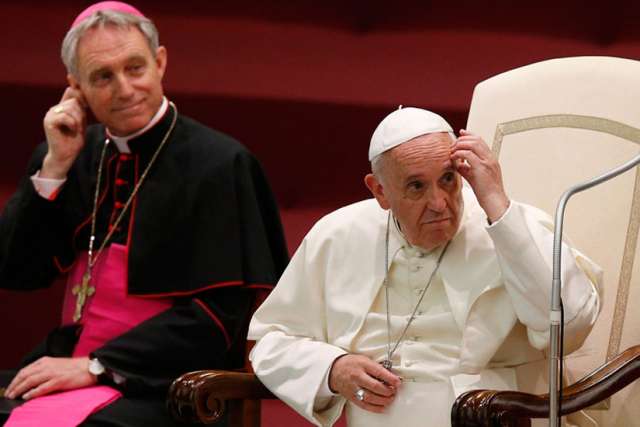Perhaps the single, most-often quoted line from Pope Francis is his response to a question he was asked vis-à-vis the morality of a particularly dicey issue. His, infamous-famous reply: “Who am I to judge?”
God’s vision is there to see if only we open our minds and hearts
By Fr. Scott Lewis, S.JAscension of the Lord (Year B) May 17 (Acts 1:1-11; Psalm 47; Ephesians 1:17-23; Mark 16:15-20)
Acts I of Luke’s magnificent account of the life, death and resurrection of Jesus ended with the commission to the apostles in the upper room, the joyful reaction of His followers and the ascension of Jesus. When the curtain went up in Act II, Luke revisited the time between the Resurrection and the ascension. This time we are treated to a detailed account of what turns out to be a leisurely 40 days of instruction on the kingdom of God.
Our soul is as vast as the universe
By Mary MarroccoEven the daily trip home from work can be an adventure. One wintry night, I stood on a jam-packed city bus impatiently tracking its slow progress up a crammed street. We finally came in sight of the station. And there we stopped. Stuck. Inexplicably, the bus glued itself in place while minutes passed.
God welcomes all and plays no favourites
By Fr. Scott Lewis, S.JSixth Sunday of Easter (Year B) May 10 (Acts 10:25-26, 34-35, 44-48; Psalm 98; 1 John 4:7-10; John 15:9-17)
Human beings have long laboured under the illusion that God is just like us, complete with human emotions, prejudices and ideas of justice. Fortunately, they are wrong, and God often demonstrates this in dramatic ways.
Seeing with eyes wide open
By Fr. Ron RolheiserSometimes you can see a whole lot of things just by looking. That’s one of Yogi Berra’s infamous aphorisms. It’s a clever expression of course, but, sadly, perhaps mostly, the opposite is truer. Mostly we do a whole lot of looking without really seeing much. Our eyes can be wide open and we can be seeing very little.
Today’s villain, tomorrow’s saint
By Fr. Scott Lewis, S.JFifth Sunday of Easter (Year B) May 3 (Acts 9:26-31; Psalm 22; 1 John 3:18-24; John 15:1-8)
Small wonder that Saul — later Paul — was feared by the Jerusalem community. They wanted nothing to do with him, for he had terrorized the community of believers in Christ relentlessly. By his own admission in his letters, Paul had hunted them down and arrested them, voting in favour of the death penalty at their trials.
Principles for interfaith dialogue, attitudes
By Fr. Ron RolheiserWe live inside a world and inside religions that are too given to disrespect and violence. Virtually every newscast documents the prevalence of disrespect and violence done in the name of religion, disrespect done for the sake of God (strange as that expression may seem). Invariably those acting in this way see their actions, justified by sacred cause.
Euthanasia blind to the mystery of love
By Fr. Ron RolheiserRaissa Maritain the philosopher and spiritual writer died some months after suffering a stroke. During those months she lay in a hospital bed, unable to speak. After her death, her husband, the renowned philosopher Jacques Maritain, in preparing her journals for publication, wrote these words:
Jesus shepherds God’s people
By Fr. Scott Lewis, S.JFourth Sunday of Easter (Year B) April 26 (Acts 4:7-12; Psalm 118; 1 John 3:1-2; John 10:11-18)
There is a rather cynical observation that no good deed ever goes unpunished. The incident in Acts seems to support those sentiments. No sooner had Peter healed a crippled man than he found himself under arrest and standing before the authorities to answer charges. He protested that they were merely doing a good deed and healing the poor man.
In the Catholic Church I found solid ground
By K. Albert LittleThis Easter I became a Catholic.
What was a long and sometimes circuitous journey culminated, in a way, at the Easter Vigil as I was confirmed, received into the Church and shared in the eucharistic celebration.
Jesus continues to share His glory
By Fr. Scott Lewis, S.JThird Sunday of Easter (Year B) April 19 (Acts 3:13-15, 17-19; Psalm 4; 1 John 2:1-5; Luke 24:35-48)












